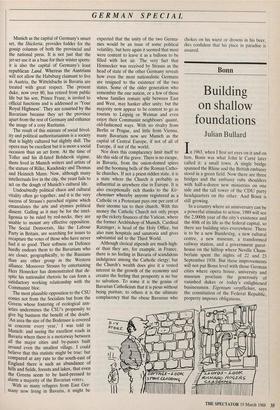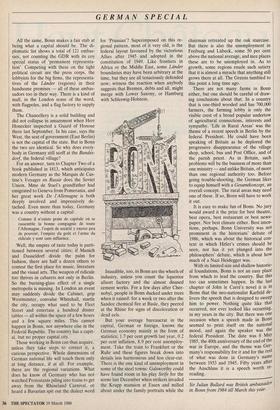Bonn
Building on shallow foundations
Julian Bullard
In 1963, when I first set eyes on it and on him, Bonn was what John le Cane later called it: a small town. .A single bridge spanned the Rhine and the British embassy stood in a green field. Now there are three bridges and the embassy rubs shoulders with half-a-dozen new ministries on one side and the tall tower of the CDU party headquarters on the other. And Bonn is still growing.
In a country where an anniversary can be a powerful stimulus to action, 1989 will see the 2,000th year of the city's existence and the 40th of its life as the federal capital, so there are building sites everywhere. There is to be a new Bundestag, a new cultural centre, a new museum, a transformed railway station, and a government guest- house on the hilltop where Neville Cham- berlain spent the nights of 22 and 23 September 1938. But these improvements will not put Bonn level with those German cities where opera house, university and museum proclaim the generosity of vanished dukes or today's enlightened businessmen. Eigentum verpflichtet, says the constitution of the Federal Republic, property imposes obligations.
GERMAN SPECIAL
All the same, Bonn makes a fair stab at being what a capital should be. The di- plomatic list shows a total of 121 embas- sies, not counting the GDR with its coy special status of 'permanent representa- tion'. Competing with these on the tight political circuit are the press corps, the lobbyists for the big firms, the representa- tives of the Lander (regions) in their handsome premises — all of these ambas- sadors too in their way. There is a kind of mall, in the London sense of the word, with flagpoles, and a flag factory to supply them.
The Chancellery is a solid building and did not collapse in amazement when Herr Honecker inspected a Guard of Honour there last September. In his case, says the West, the seat of government (East Berlin) is not the capital of the state. But in Bonn the two are identical. So why does every- body in Germany still scoff at the Bundes- dorf, the federal village?
For an answer, turn to Chapter Two of a book published in 1813, which anticipates modern Germany as the Marquis de Cus- tine's Voyages en Russie does the Soviet Union. Mme de Stael's grandfather had emigrated to Geneva from Pomerania, and her great work De l'Allemagne is both deeply involved and impressively de- tached. Even more than today, Germany was a country without a capital:
Comme it n'existe point de capitale oh se rassemble la bonne compagnie de toute l'Allemagne, Itesprit de societe y exerce peu de pouvoir; l'empire du gout et l'arme du ridicule y sont sans influence.
Well, the empire of taste today is parti- tioned between several cities; if Munich and Dusseldorf divide the palm for fashion, there are half a dozen others to contest the first place for music, literature and the visual arts. The weapon of ridicule too thrives in cabarets not only in Berlin. So the burning-glass effect of a single metropolis is missing. In London an event may suddenly divide the Cabinet, grip Westminster, convulse Whitehall, startle the city, occupy what used to be Fleet Street and entertain a hundred dinner tables — all within the space of a few hours and a few square miles. This cannot happen in Bonn, nor anywhere else in the Federal Republic. The country has a capit- al, but no proper capital city.
Those working in Bonn can thus acquire, unless they take steps to correct it, a curious perspective. Whole dimensions of German national life will touch them only at long distance, if at all. For example, there are the regional variations. What does he know of Germany who has not watched Protestants piling into trains to get away from the Rhineland Carnival, or heard a Bavarian spit out the dialect word for 'Prussian'? Superimposed on this re- gional pattern, most of it very old, is the federal layout favoured by the victorious Allies after 1945 and adopted in the constitution of 1949. Like frontiers in Africa or the Middle East, some Lander boundaries may have been arbitrary at the time, but they are all tenaciously defended now; witness the reaction when anybody suggests that Bremen, debts and all, might merge with Lower Saxony, or Hamburg with Schleswig-Holstein.
Inaudible, too, in Bonn are the wheels of industry, unless you count the liquorice allsort factory and the almost disused cement works. For a few days after Cher- nobyl, people in Bonn ducked under trees when it rained: for a week or two after the Sandoz chemical fire at Basle, they peered at the Rhine for signs of discoloration or dead eels.
But your average bureaucrat in the capital, German or foreign, knows the German economy mainly in the form of statistics; 1.7 per cent growth last year, 0.2 per cent inflation, 8.9 per cent unemploy- ment. Take the train to Frankfurt or the Ruhr and these figures break down into details less harmonious and less clear-cut. There is the one kind of unemployment in some of the steel towns: Galsworthy could have found room in his play Strife for the scene last December when strikers invaded the Krupp mansion at Essen and milled about under the family portraits while the chairman retreated up the oak staircase. But there is also the unemployment in Freiburg and Lubeck, some 50 per cent above the national average, and nice places these are to be unemployed in. As to growth, some regions exude such satiety that it is almost a miracle that anything still grows there at all. The Greens tumbled to this point a long time ago.
There are not many farms in Bonn either, but one should be careful of draw- ing conclusions about that. In a country that is one-third wooded and has 700,000 farmers, the farming lobby is only the visible crest of a broad popular undertow of agricultural connections, interests and sympathy. 'Life in Rural Areas' was the theme of a recent speech in Berlin by the federal President. He could have been speaking of Britain as he deplored the progressive disappearance of the village shop, school, bus and Post Office, and of the parish priest. As in Britain, such problems will be the business of more than one ministry — and unlike Britain, of more than one regional authority too. Before going trouble-shooting, the German likes to equip himself with a Gesamtkonzept, an overall concept. The rural areas may need one of these. If so, Bonn will have to work it out.
It is easy to make fun of Bonn. No jury would award it the prize for best theatre, best opera, best restaurant or best news- paper. Nor best climate either. Best inten- tions, perhaps. Bonn University was not prominent in the historians' debate of 1986, which was about the historical con- text in which Hitler's crimes should be seen, nor has it yet plunged into the philosophers' debate, which is about how much of a Nazi Heidegger was.
With its limited size and shallow historic- al foundations, Bonn is not an easy place from which to lead the country. But this too can sometimes happen. In the last chapter of John le Carres novel it is in Bonn that the neo-nationalist Karfeld de- livers the speech that is designed to sweep him to power. Nothing quite like that occurred, nor ever looked like occurring, in my years in the city. But there was one occasion when a speech made in Bonn seemed to print itself on the national mood, and again the speaker was the federal President. The date was 8 May 1985, the 40th anniversary of the end of the war in Europe, and the theme was Ger- many's responsibility for it and for the rest of what was done in Germany's name between 1933 and 1945. Fifty years after the Anschluss it is a speech worth re- reading.
Sir Julian Bullard was British ambassador in Bonn from 1984 till March this year.

























































 Previous page
Previous page